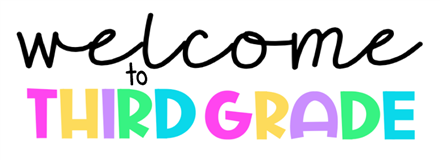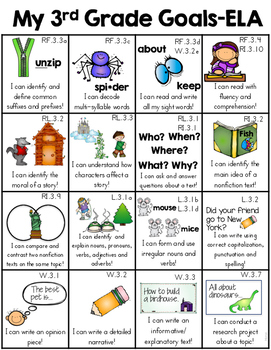
From 2nd to 3rd: A Big Leap!
Your child has mastered the fundamentals in 1st grade and 2nd grade, and is now ready to thrive in third grade! But it’s not just another year. This grade is a very important time in your child’s education, because it’s when students transition from what are often known as the “lower grades” to the “upper grades.” It’s also an EXCITING time in your child’s education, both academically and socially! Your third grader is on their way to becoming a more independent and mature learner.
Read on to learn more!

Third Grade Social Changes
During this phase you begin to really catch glimpses of the young adult they are on their way to becoming. At the same time, your child has not completely left childhood behind. While your child may begin to exhibit more confidence, independence, and express the desire to not be so closely tied to parents, they are still full of silliness. You may begin to notice more pop culture references in their jokes, as they giggle with friends in the back of your car during school pick up. By third grade, children are becoming more aware socially, and become more influenced by external forces. Friends, music, video games, and internet, begin impacting your child’s perception of the world at this stage of development, more so than during previous stages of your child’s life. The impact of outside influences can often be unnerving for many parents of third graders.
Third Grade Academics
Your third grader is facing huge changes academically. Here’s a look at the academic challenges your student will begin to experience (to read about this content in further detail, keep reading below):
At a Glance
- By the beginning of third grade, kids are expected to be able to do basic writing, editing, and revising.
- They’re also expected to have mastered basic reading skills and start focusing on comprehension.
- Third graders need to be familiar with three-digit numbers and know which of the digits is in the “ones” place and which is in the “tens” and the “hundreds” place.
Want to learn more about how where your child should be academically before moving from second to third grades? Head over to the Parent University homepage, scroll to the bottom of the page, and find a ton of great videos under the heading “K-12 Milestones!”
Here’s a link to the Milestones videos all about third grade!
Your third grader is also faced with standardized testing for the first time. These scores often determine whether a school is labeled as successful, and so there is added pressure placed your child to master concepts (to read about standardized testing in further detail, please consult the March 2021 edition of Power Parent Magazine – it’s ALL ABOUT state testing!).
As a result of this stress, third graders often begin to exhibit new emotions about school that they have never felt before. Often children begin to feel anxiety about homework and going to school because the pressure to succeed has increased. Many children struggle with perfectionist tendencies, trying to make their work perfect, because they have a growing sense that everything they do has impact on their success.

As a parent you can help your child have an easier transition from second to third grade. You need to become more aware of who their friends are and what external influences may be impacting your child. Do not be afraid to filter friends who you think may have a negative impact. Encourage your child to be more independent and hang out with friends, but also set aside time to connect one-on-one. Family dinner without distractions, planning activities that encourage family engagement, and even just making time to talk becomes increasingly important at this stage. Your third grader may protest, but in the long run, they will love you for taking the initiative to engage them and get to know the person they are becoming.
Getting more involved in their academics becomes important as well. As a parent, you can help your child mitigate the increased stress of performing well at school by offering lots of encouragement. Praise the effort they put into learning a new concept, memorizing facts, or spending extra time to do an assignment well. Be sure to iterate to your child that tests and grades do not necessarily determine future success. If your child faces struggle, or even failure, help them see that these moments are part of the learning process. Turn homework into a game, especially if rote memorization is involved. Make time to quiz, even in short spurts while driving your car or cooking dinner. Help provide spaces that are conducive for your child to accomplish their homework. Your child may like to crawl away in quiet, or your child may need the social interaction of sitting near you, while you cook, surf the internet, or do your tasks. To balance the intensified work load, be sure to provide your child with unscheduled downtime, where they can just be themselves, doing what they like to do.

Most importantly, let your child know they are loved and encourage laughter. Even if they act embarrassed, tell them you love them and be silly with them. They may roll their eyes at you, but deep down it matters to your child. It is so much easier to face challenges, new experiences, and big transitions, when you know someone cares.
https://www.youtube.com/watch?v=ArTpoQHv9hE&ab_channel=GreatSchools
During second grade, kids keep building skills in reading, writing, and conversation. They learn to think about and summarize what they read in many different types of texts. This includes stories, articles, and books with multiple chapters.
Rising third graders are expected to know how to collect information about a single topic from a variety of sources and summarize it. They’re also expected to use editing and revising skills in their writing. Here are some ways kids build skills in these areas and get ready for third grade:

- Read fables and folktales from different cultures and identify the central message, lesson, or moral in the stories
- Read about science, social studies, and history and determine the purpose and main idea of these texts
- Answer who, what, where, when, why, and how questions about stories (both in writing and when speaking), using the rules of standard English
- Describe how an author uses detail to support an idea
- Gather facts about a topic and describe what was learned
- Write about an event with a beginning, middle, and end
- Write about books using details and examples to back up opinions
Skills to get ready for grade 3: Mathematics
By the beginning of third grade, kids start using abstract thinking skills in math. They’re working with three-digit numbers and using their understanding of place value (like knowing that the “3” in “357” is in the hundreds place and means “300,” the “5” is in the tens place and means “50,” and so on).
Place value is an important concept. It not only helps with addition and subtraction but serves as the foundation for the rounding, multiplying, and dividing that will occur in third grade.
Second graders keep working on addition and subtraction and start learning how to measure objects and shapes. By the end of second grade, kids are expected to be able to do activities like these:

- Add and subtract numbers up to 100 to solve one- or two-step word problems
- Add and subtract up to 20 using mental math strategies (instead of having to do the calculations on paper)
- Understand the ones, tens, and hundreds place in a three-digit number
- Start adding and subtracting three-digit numbers
- Read and write numbers up to 1,000
- Measure and also estimate length using inches, feet, centimeters, and meters
- Solve problems using money values, like knowing that a dime equals 10 pennies
- Divide circles, squares, and rectangles into equal portions (halves, thirds, quarters)
- Solve word problems using information from a bar graph
Did you find these videos helpful?
We hope so! If you did, head over to the Parent University homepage, scroll to the bottom of the page, and find a ton of great videos under the heading “K-12 Milestones!”
